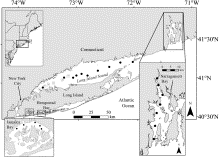
Northeast U.S. coastal areas experiencing low oxygen and acidic conditions. (Courtesy C. Gobler, SUNY Stony Brook)
Eutrophication, or increased nutrient loading to estuaries, causes algae to bloom and consequently coastal hypoxia (low oxygen waters) when the algal biomass decomposes. Often overlooked, eutrophication can also produce carbon dioxide, which leads to a lowering of seawater pH (or increasing acidity). A recent invited paper by scientists supported by NCCOS and theNOAA Ocean Acidification Program shows low pH conditions present in Narragansett Bay (RI), Long Island Sound (CT and NY), Jamaica Bay (NY), and Hempstead Bay (NY) during summer and fall months concurrent with the decline in oxygen. This was especially true in regions close to sewage discharges, though relatively low pH conditions were observed in eutrophic regions even when hypoxia did not occur.
This study provides new insight regarding the extent of coastal acidification as well as evidence that it represents a significant, but previously disregarded environmental threat associated with eutrophication. The pH levels recorded have the potential to negatively impact the growth and survival of ecologically and economically valuable marine organisms. Results indicate that nutrient management plans for estuaries may need to consider the consequences of acidification as well as dissolved oxygen when setting management goals.
For more information, contact Elizabeth.Turner@noaa.gov.
 Official websites use .gov
A .gov website belongs to an official government organization in the United States.
Official websites use .gov
A .gov website belongs to an official government organization in the United States. Secure .gov websites use HTTPS
A lock or https:// means you’ve safely connected to the .gov website. Share sensitive information only on official, secure websites.
Secure .gov websites use HTTPS
A lock or https:// means you’ve safely connected to the .gov website. Share sensitive information only on official, secure websites.